Now Accepting Films For The 8th International Disability Film Festival BREAKING DOWN BARRIERS
- Details
- Category: Новости
- Published on Wednesday, 17 February 2016 14:29
- Written by Administrator
- Hits: 13882
During the first seven festivals more than 600 films from 55 countries were screened. More than 15 000 people attended Moscow’s festivals and more than 30,000 people in 25 regions of Russia attended regional festivals. Festivals also took place in Armenia, the Kirgiz Republic, Uzbekistan, Azerbaijan, Ukraine, Moldova and Georgia. Finally, Perspektiva and its partners continue to use these films to educate people in their communities about a wide variety of disability issues.

The best movies will be selected in the following nominations:
- Best Feature Film
- Best Short Feature Film
- Best Full Length Documentary
- Best Short Documentary
- Best Actor / Actress
- Best Film about Love
- Most Uplifting
- Best Film about Shattering Stereotypes
- Best Public Service Announcement
- Best Film about Intellectual Disability
There will also be special prizes and awards, including Audience Award.
The Festival will also feature a competition for the best movie about people with disabilities made by children. The goal of the competition is to promote communication between children with and without disabilities by allowing them to work together on a movie about disability issues.
PLEASE NOTE, THE DEADLINE FOR SUBMITTING FILMS HAS BEEN EXTENDED TO JUNE 30, 2016!
Film makers are informed about selection for screening on September 30st, 2016.
If you have any questions, please contact the film festival coordınator Elizaveta Kurbanova: This email address is being protected from spambots. You need JavaScript enabled to view it..
The winners of the 7th International Film Festival ‘Breaking Down Barriers’
- Details
- Category: Новости
- Published on Tuesday, 18 November 2014 14:03
- Written by Administrator
- Hits: 17123
The closing ceremony for the 7th International Film Festival ‘Breaking Down Barriers’ was held on November 17 at the October movie theater.

Those attending the closing ceremony were the first to learn which films had been selected as prize winners by the jury, headed by film director Vadim Abdrashitov.
 The festival's Grand Prix went to an animated short, Macropolis, by British director Joel Simon. This straightforward cartoon told the story of a toy cat and dog made from defective parts who nevertheless managed to find a child who loved them. Macropolis brought tears to the eyes of both adults and children in the audience.
The festival's Grand Prix went to an animated short, Macropolis, by British director Joel Simon. This straightforward cartoon told the story of a toy cat and dog made from defective parts who nevertheless managed to find a child who loved them. Macropolis brought tears to the eyes of both adults and children in the audience.



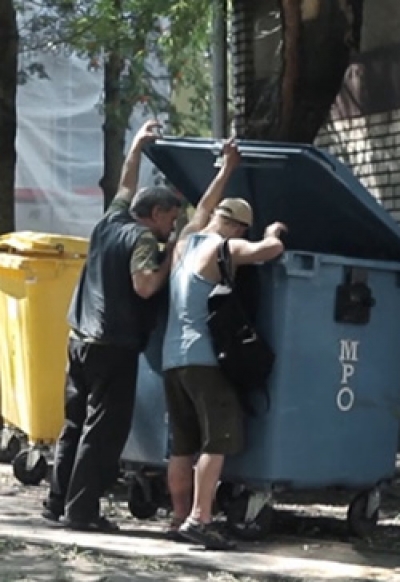 James Doolan, a British actor with autism, was named best actor for his work in Bastion, by Ray Jacobs. Tracie Sammut, an Australian actress with Down Syndrome, won best actress for her performance in Francis and Annie, by Genevieve Clay-Smith. “When you watch these films, you reevaluate your own life and your own problems…I’m thankful to the festival for this intense emotional experience,” said the actress and presenter Polina Kutepova.
James Doolan, a British actor with autism, was named best actor for his work in Bastion, by Ray Jacobs. Tracie Sammut, an Australian actress with Down Syndrome, won best actress for her performance in Francis and Annie, by Genevieve Clay-Smith. “When you watch these films, you reevaluate your own life and your own problems…I’m thankful to the festival for this intense emotional experience,” said the actress and presenter Polina Kutepova.
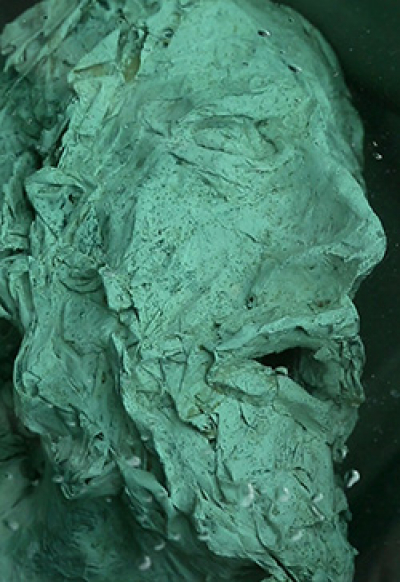 The best film about love went to the French film My Sweetheart, by Daniel Metge. Gregory Givernaud, who played one of the main characters, received the prize from the distinguished singer Diana Gurtskaya.
The best film about love went to the French film My Sweetheart, by Daniel Metge. Gregory Givernaud, who played one of the main characters, received the prize from the distinguished singer Diana Gurtskaya.
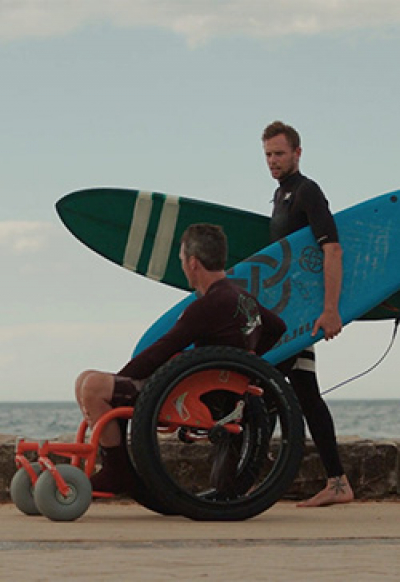 The jury granted My Way to Olympia by German director Niko Glagow the distinction of most uplifting film.
The jury granted My Way to Olympia by German director Niko Glagow the distinction of most uplifting film.
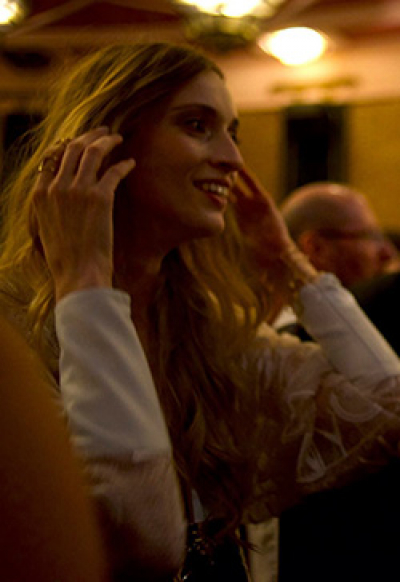 The best public service announcement award went to Maria's Journey, a film by Spanish artist and director Miguel Gallardo about his daughter, who has autism. Awarding the prize was Vladimir Krupennikov, Member of the State Duma, who noted that, “Film is the most direct means we have to bring our problems to the attention of society.”
The best public service announcement award went to Maria's Journey, a film by Spanish artist and director Miguel Gallardo about his daughter, who has autism. Awarding the prize was Vladimir Krupennikov, Member of the State Duma, who noted that, “Film is the most direct means we have to bring our problems to the attention of society.”
 The best film about intellectual disability (a prize sponsored by Best Buddies Russia) was awarded to Special Needs, a joint German and Italian production. Two Best Buddies participants, Marina and Nastya, presented the prize to Carlo Zoratti, who played the main character.
The best film about intellectual disability (a prize sponsored by Best Buddies Russia) was awarded to Special Needs, a joint German and Italian production. Two Best Buddies participants, Marina and Nastya, presented the prize to Carlo Zoratti, who played the main character.
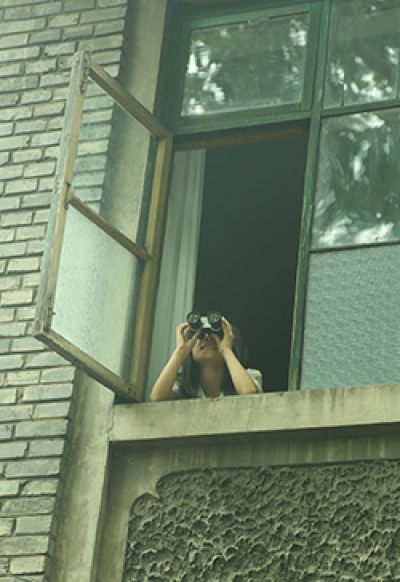 Winning the prize for best film about aging and disability was Wrinkles, a full-length animated film by Spanish director Ignacio Ferreras. Vadim Samorodov, a representative of the Timchenko Foundation, presented the award to producer and scriptwriter Angel De La Cruz.
Winning the prize for best film about aging and disability was Wrinkles, a full-length animated film by Spanish director Ignacio Ferreras. Vadim Samorodov, a representative of the Timchenko Foundation, presented the award to producer and scriptwriter Angel De La Cruz.
 The jury selected After the War, by Yevgeny Golynkin and Veronika Solovyova, as best film about disability rights.
The jury selected After the War, by Yevgeny Golynkin and Veronika Solovyova, as best film about disability rights.
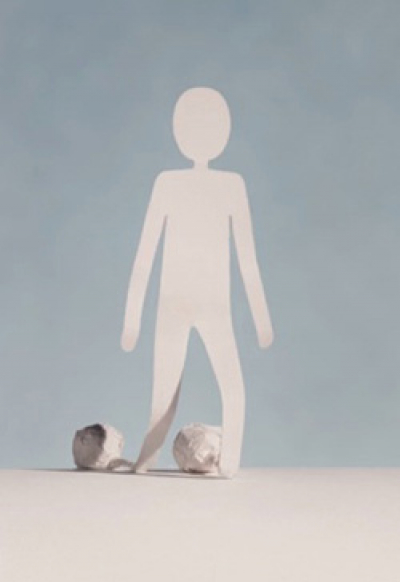 The Iranian film Unknown Beauty by Mahboubeh Honarian was granted the distinction of best film about shattering stereotypes, and Clay won the award for best original content. Jury member and presenter Yevgeniya Montaña Ibañez concluded, “I’m very pleased that I was on the jury of this particular festival, which was so warm and unusual. The organization and organizers themselves are to be admired for their work.”
The Iranian film Unknown Beauty by Mahboubeh Honarian was granted the distinction of best film about shattering stereotypes, and Clay won the award for best original content. Jury member and presenter Yevgeniya Montaña Ibañez concluded, “I’m very pleased that I was on the jury of this particular festival, which was so warm and unusual. The organization and organizers themselves are to be admired for their work.”

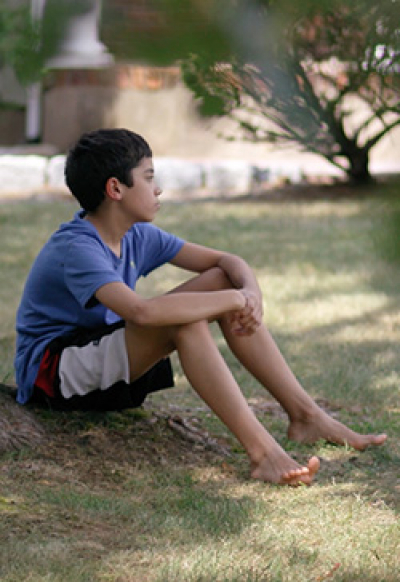 Actress and talk show host Olga Shelest presented the prize for audience favorite to Be Happy, by Anton Pogrebnoy.
Actress and talk show host Olga Shelest presented the prize for audience favorite to Be Happy, by Anton Pogrebnoy.
For the first time, this year’s festival also included a children's jury. It awarded the best film by a child to Clouds from Knopka, a school television studio in Tver region.
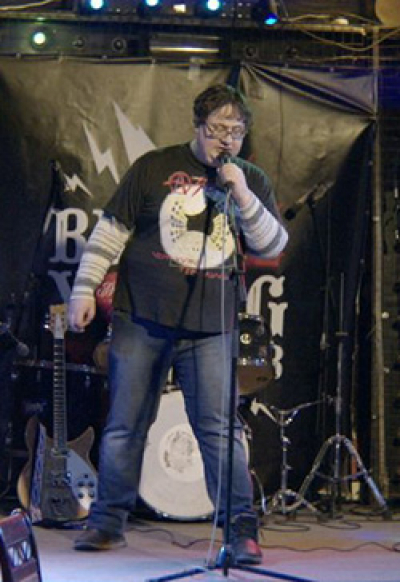 The honor of best children's film was presented to the Irish animated Punky, by Gerard O'Rourke. Actors Sergey Druziak and Ivan Gromov presented the prize together with Jannett Bazarova, a young disabled activist who was also a member of the children’s jury. After receiving the award, Aimee Richardson, an Irish actress with Down Syndrome who provided the ‘voice’ of the little girl Punky, entertained the audience by playing melodies of her own composition on the Irish flute.
The honor of best children's film was presented to the Irish animated Punky, by Gerard O'Rourke. Actors Sergey Druziak and Ivan Gromov presented the prize together with Jannett Bazarova, a young disabled activist who was also a member of the children’s jury. After receiving the award, Aimee Richardson, an Irish actress with Down Syndrome who provided the ‘voice’ of the little girl Punky, entertained the audience by playing melodies of her own composition on the Irish flute.
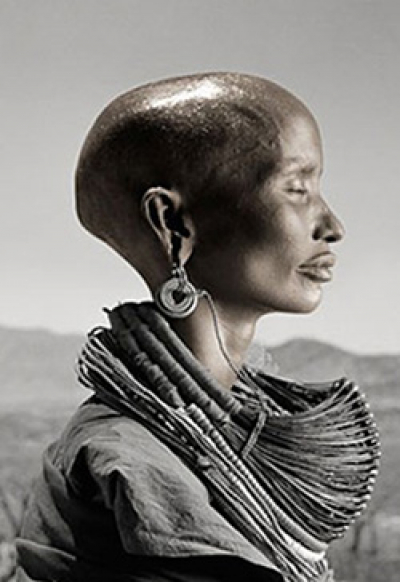 Interviewer, by Genevieve Clay-Smith and Robin Bryan, was honored as best short feature film. After accepting the prize Gerard O’Dwyer, an Australian actor with Down Syndrome and the film’s main character, performed a short scene from Harry Potter. This year marks the first time guests from Australia and Ireland attended Breaking Down Barriers.
Interviewer, by Genevieve Clay-Smith and Robin Bryan, was honored as best short feature film. After accepting the prize Gerard O’Dwyer, an Australian actor with Down Syndrome and the film’s main character, performed a short scene from Harry Potter. This year marks the first time guests from Australia and Ireland attended Breaking Down Barriers.
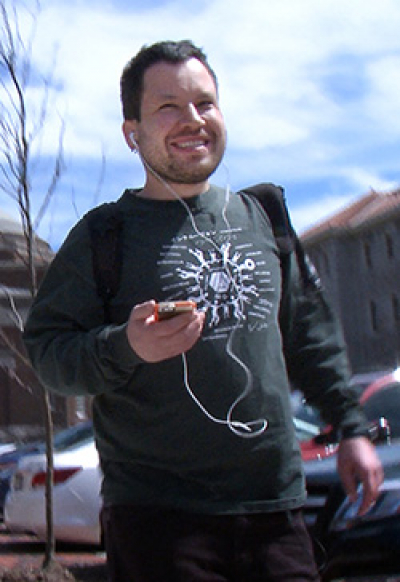 Finally, the best feature film award went to Keep Rolling, a joint German and Swiss production by Stefan Hillebrand. Presenting the award to Bastian Wurbs, one of the film’s actors, actress Irina Bezrukova said: “Even though these films sometimes touch on tragedy, they manage to create a positive feeling…I learned a lot about people with disabilities and I have to say I’d be interested in acting in a film on this topic.”
Finally, the best feature film award went to Keep Rolling, a joint German and Swiss production by Stefan Hillebrand. Presenting the award to Bastian Wurbs, one of the film’s actors, actress Irina Bezrukova said: “Even though these films sometimes touch on tragedy, they manage to create a positive feeling…I learned a lot about people with disabilities and I have to say I’d be interested in acting in a film on this topic.”
In his closing remarks, Vadim Abdrashitov concluded, “I think these films should be shown not only at this festival, but every day on national television, imparting tolerance, understanding, and concern for other people to viewers…Viewers shouldn’t only see action heroes, but other people whose courage and strength elicit our admiration.”

In her address at the festival, Perspektiva director Denise Roza noted two more films, Notes on Blindness and Just As I Remember, which received the awards for best cinematography and for courage in self-exploration, respectively. “I was so pleased to hear from members of the audience and from people who traveled to our festival that they were very happy. If our festival was an emotional and rewarding learning experience for them, then we have achieved our goals,” said Ms. Roza. “Now we’d like to ensure that viewers in other Russian regions have the chance to see them and learn about the lives of people with disabilities.”
“Breaking Down Barriers” is the only film festival in Russia where all screenings are accompanied by audio description and subtitles in Russian, and all discussions are translated into sign language.
http://old.kinofest.org/en/2014/press-release-2014/8-news#sigProGalleriae511b393b4
Photographer: Olga Maximova
Overcoming Mediocrity
- Details
- Category: Новости
- Published on Monday, 17 November 2014 13:14
- Written by Administrator
- Hits: 14511

British director Ray Jacobs presented his short feature “Bastion,” about which the participants of the workshop have already heard a lot. The reason for that was the unusual popularity of the protagonist—a young actor with special needs James Doolan. His visit to one of the usual English barbershops made it possible to make an outstanding movie about the limits of imagination and reality, a child’s play and deep life philosophy.

His colleague, director Kate Monaghan, presented a movie about children with Down’s syndrome—“Breaking Free.” It is a story of three teenagers, 12 to 14 years old, and their growing up. They make their first steps in the adult world, face challenges and overcome them on their way to their dream. Nicole is 13 years old and she has a boyfriend also with Down’s syndrome. This story is not only about Nicole, but also about her relationship with her mother, about earning trust and respect for her private life.
Ruben is a great swimmer who trains together with older children in British Sports School of Olympic Reserve for youth with special needs. He is very goal oriented and Kate’s team had to spend several weeks literally swimming together with him before the filming began, so that he would let them in his world, which was just as unusual and dynamic as the swimmer himself.
The team met Harley on a seashore, and he was so “cool and stylish” no one could think about his diagnosis. Kate and her team surfed in the cold English sea to become friends with him. The story of the footage is the story of earning the young actors’ trust and a story of a long-time friendship no one from the film crew would like to end.

German directors and authors Michael Bernstein and Marina Samokhina led a workshop about the film “Benedikt Lika—Roll and Walk to Rußland.” It is the story of a young musician who is the director of a small but very talented German orchestra. The meeting took place as a teleconference. The participants could directly ask the actor in Augsburg, who answered their questions via Skype. He, while using a wheelchair, gathers huge audiences for his musical performances. One day Russia became a topic of such a performance. Last May, Benedikt became a member of the City Council of his hometown. He believes that music affects souls and that he will be able to direct his hometown’s policy in the proper direction.
By Vladislav Zemenkov
Interview with the Director
- Details
- Category: Новости
- Published on Tuesday, 18 November 2014 01:55
- Written by Administrator
- Hits: 14723

“No, I wanted to make usual teenagers without disabilities a little bit kinder, to awaken empathy and interest in the topic.”
“What is special when working with such characters and actors?”
“In general, it is easier to work with children, because you do not need to lie to them. They can easily feel insincerity, and that is why they always act better than adults, they really channel and live the emotions of their characters.”
“Was it difficult to make a movie like this?”
“It is easier to film about bad things. It is easier to show off one’s worse attributes, it is harder to help someone that to hurt. Being able to see good in the middle of problems and suffering is a victory.”
Interview by Regina Ader
"We have our world, and the hearing have theirs"
- Details
- Category: Новости
- Published on Monday, 17 November 2014 12:05
- Written by Administrator
- Hits: 13702

Viewers had the chance to talk to the star of the film, who traveled to Moscow for the festival. Ellen shared her story with the audience,saying, "It was my decision to go to a regular school. My parents thought differently, but I convinced them. But I wasn't even given the opportunity to try and understand whether I could learn at a school for the hearing."
Her audience was upset to hear this outcome, and asked Ellen what she planned to do next. "At first I was very interested in the hearing world," she said with a shrug of her shoulders, "but in the school for students with hearing problems there's discrimination, too, it turns out, so I returned. I don't know what will come next. We have our world, the hearing have theirs."
Yulia Kutasevich, Ilona Yakovleva







































.png)








.png)








.png)

.png)



